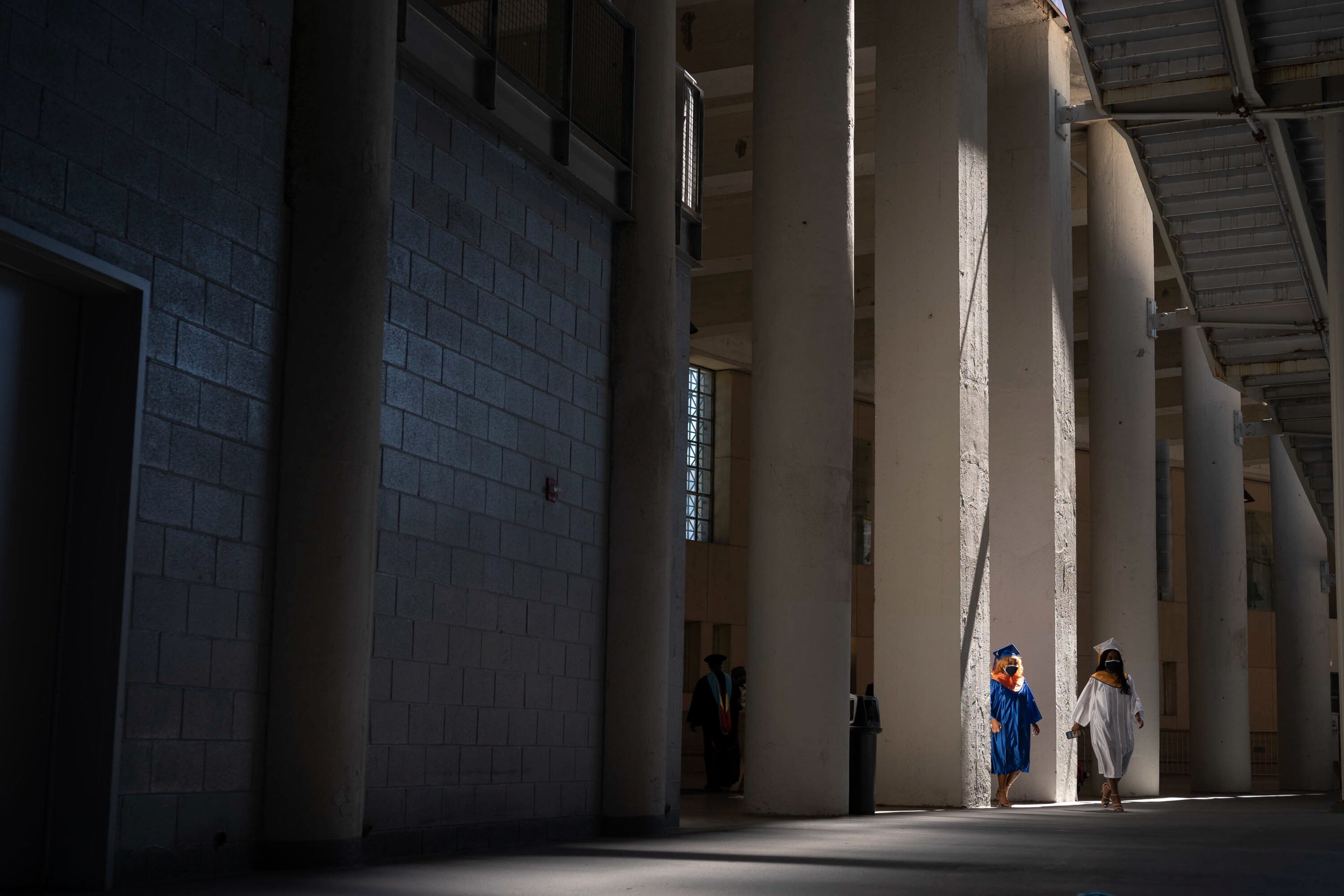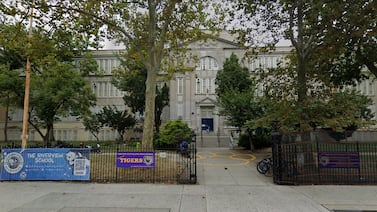You can find your school’s graduation rate using the searchable table at the bottom of this story
Graduation rates in New York City rose to 81% last school year, about 2 percentage points higher than the previous year, state officials announced Wednesday.
Across the state, 86% of students graduated — roughly 1 percentage point higher than the previous school year.
New York’s data comes as graduation rates have dipped in at least 20 states.
For the second year in a row, as the pandemic disrupted teaching and learning, state education officials made it easier to graduate in the 2020-2021 school year. They canceled most Regents exams and allowed students to be exempt from taking the exams to graduate, since many students were learning exclusively from home. Instead, students had to pass the course tied to the normally required Regents exam.
In New York City, about 60% of students remained fully remote by the end of the school year, while the rest spent most of the year splitting their weeks between learning from home and inside a classroom.
With two years of school disruptions, many students who graduated in 2021 did not have the opportunity to take Regents exams during their junior or senior years, which is when many of the exit exams are typically taken, state officials said. Because of that, a total of 44,545 New York City seniors — or nearly three-quarters — were granted at least one waiver last year for the exams, compared with roughly 8,000 seniors in 2020. Statewide, 82% of seniors were granted an exemption.
Betty Rosa, the state education department’s commissioner, told reporters that canceling the Regents exams was “likely a factor” in the graduation rate increase. But, she added, the magnitude of the effect “can not be determined, as many of these affected students would have passed the Regents exam” had the tests still been offered.
Along with rising graduation rates, dropout rates dipped. Five percent of city students dropped out — 1 percentage point less than last school year — compared to 4.2% statewide.
‘Identify where inequities exist’
Graduation rates of New York City’s Asian students far outpaced their peers. Roughly 91% of Asian students graduated within four years, compared with 82% of white students, 79% percent of Black students and 78% of Latino students.
White students saw graduation rates dip by 2 percentage points year-over-year, unlike their Asian, Black and Latino peers, who saw rates increase.
Students learning English as a new language and children with disabilities continued to graduate at significantly lower rates than their peers — but there was improvement compared to last year.
English learners posted a graduation rate of 60%, more than 14 percentage points higher than last year. The big jump might be due to the cancellation of the English Regents exam, state officials said. Additionally, students who may no longer have met “English Language Learner” status could not test out of the program in 2020, since the exam was canceled that year, and was not required for remote learners last year. Former English language learners tend to post graduation rates that are higher than students citywide, and these students may have skewed this year’s results.
About 58% of students with disabilities earned their diplomas, 5 percentage points higher than 2020.
While graduation rates were highest in Staten Island and Queens at about 85%, they grew the most in the Bronx, to 77% up from 73% in 2020. About 82% of Manhattan seniors graduated, and 78% of Brooklyn’s did.
“Graduation rates are one metric we use to identify where inequities exist so we can better support our students and education communities,” Board of Regents Chancellor Lester W. Young Jr. said in a statement. “Every student can succeed when given the support to do so. Until we address them, inequities will continue to diminish opportunities for too many students.”
‘Focused on graduating’
The state is planning to administer Regents exams this June and August, even though officials canceled the exams in January amid a spike in coronavirus cases, Rosa said.
“We’ve been having all of these conversations, with superintendents, with principals, all of our stakeholders,” she said. “And right now, the Regents exam is still on schedule.”
The lack of Regents exams helped Clementina Sarpong, who graduated last spring as valedictorian from DeWitt Clinton High School in the Bronx. She received an exemption her junior year for her Chemistry Regents and another waiver last year for Spanish, which she needed to earn an Advanced Regents diploma.
Teachers also seemed more flexible. For example, Sarpong’s teacher for Advanced Placement biology would give students more time to complete assignments when needed, she said. However, some of her peers said it was tough to grasp complicated concepts through remote learning. They felt it was harder to ask questions in a Zoom chat room, compared with raising their hand in class.

The isolation of remote learning took a “mental toll,” Sarpong said. She and her fellow student government board members tried to arrange various student events at the start of last year, but the administration denied most of their proposals out of concerns for COVID safety or lacking the funds to put on events, Sarpong said.
“It was a bunch of continuous ‘no’s,’ where we just gave up and focused on graduating,” said the 18-year-old, who now attends a 7-year program at the CUNY College of Medicine to earn her bachelor’s and medical degrees.
The Board of Regents is continuing long-delayed discussions on how to reconfigure New York graduation requirements and have created a blue ribbon commission to study potential changes, but tweaks wouldn’t be considered until at least 2024.
That discussion had been stalled from March 2020 until last fall as state officials responded to the public health crisis. In October, state officials announced a pilot program for alternate ways of earning a diploma that don’t involve taking a Regents exam.
Search for your school’s graduation rate below.







